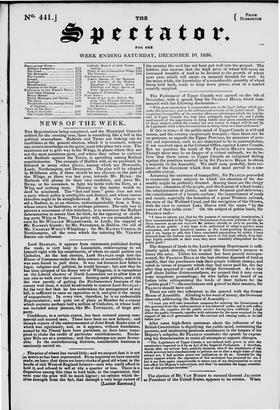The Parliament of Upper Canada was opened on the 9th
of November, with a speech from Sir FRANCIS HEAD, which com- menced with the following declaration- " With great satisfaction I congratulate you on the loyal feeling which per- vades this province, and on the stillness and serenity of the public mind. The auspicious tranquillity of the country offers you advantages which the Legisla- ture of Upper Canada has long been unhappily deprived of; and I gladly avail myself of the opportunity to bring before your grave consideration some of those subjects which the country has now reason to expect will be met by its Legislature with a firm determination to bring them to a final settlement."
If this is true,—if the public mind of Upper Canada is still and serene, and the country auspiciously tranquil,—then there can be no pretence, as regards the Upper Province, for measures of seve- rity and repression, such as are rumoured to be in contemplation, if not resolved upon at the Colonial Office, against Lower Canada. But we question the truth of Sir FRANCIS HEAD'S assertion. Though there may be no danger of a violent outbreak, we do be- lieve that there exists in Upper Canada an indignant feeling against the practices resorted to by Sir FRANCIS HEAD to obtain a majority in the Assembly. We shall soon, probably, have evi- dence of the discontent which does and must prevail to a con- siderable extent.
Assuming the existence of tranquillity, Sir FRANCIS proceeded to enumerate many subjects to which the attention of the As- sembly might be profitably directed. Among them are the clergy reserves ; education of the people, and the disposal of school-lands; the administration of justice, and more frequent gaol-deliveries; the establishment of a lunatic asylum ; the improvement of roads and canals, especially the formation of a great Western railroad, the state of the Welland Canal, and the navigation of the Ottawa, with the view to connect Lake Huron with the ocean " by the waters of that noble river." On the subject of public lands, Sir FRANCIS said- " I have to inform you, that for the purpose of encouraging immigration, I have recommended to his Majesty's Government that such portions of the mi- litary reserves as are not miniver' fer defence should, as early as possible, be offered to the public. 1 also hope to be authorized to adopt a quicker, more convenient, and more beneficial system, in the Land-granting Department; and I am happy to add, that I have concluded negotiations by which, I have obtained from the Indians very extensive tracts of rich land, which, from feel- ings highly creditable to their race, they have cheerfully relinquished for the public good."
The disposal of lands in the Land-granting Department is suffi- ciently quick already, when it suits the Governor's purpose to hurry the sales. Unless his conduct has been grossly misrepre- sented, Sir FRANCIS HEAD at the last election disposed of land so rapidly, that the purchasers took their grants without stamps, and voted in virtue of property which they had never paid for, the day after they acquired it—and all to oblige Government. As to the puff about Indian disinterestedness, we suspect that it may cover some iniquitous proceedings; for who before ever heard of an Indian tribe relinquishing the lands of their fathers for the " public good ? "—the convenience and gain of us their masters, Sir FRANCIS should have said.
There are only two references to the quarrel with the former House of Assembly. Alluding to his want of money, the Governor observed, addressing the House of Assembly-
" I trust you will take immediate measures fur relieving the Government of this province from the embarrassment it has laboured under, and is still suffer- ing, from the supplies for the public service having been withheld. I shall direct the public accounts, together with estimates for the sums required for the support of the civil government for the current and ensuing years, to be laid before you."
After some high-flown sentences about the influence of the British Constitution in dignifying the public mind, restraining the passions, and implanting generous sentiments in the breasts of his Majesty's subjects, Sir FRANCIS concludes the speech by expres- sing his determination to resist all attempts at organic changes. "The Legislature of Upper Canada is not imbued with power to alter the constitution imparted to it by an Act of the Imperial Parliament. I therefore, shortly after my arrival here, publicly declared, that if the inhabitants of the whole province were simultaneously to petition me to alter a single letter of that solemn act, I had neither power nor inclination to do so. Grateful for the manly support which the expression of this sentiment has procured for me, I feel it my duty again unequivocally to assure you of my determination to carry into effect his Majesty's instructions, and thus 'to maintain the happy constitu. tion of this province inviolate.'"


























